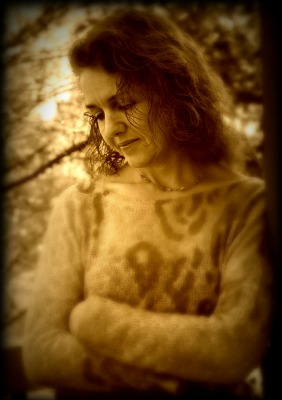
Susan Gabrielle
Creative Nonfiction
Susan Gabrielle’s work has been published or is forthcoming in The Christian Science Monitor, Heyday, TheBatShat, San Francisco Peace and Hope, and Bethlehem Writers, and she was a finalist in the Tiny Lights Narrative Essay Contest. Susan’s short story “What she should have said” was published in the Social Justice issue of the Little Patuxent Review, and she was nominated for a Pushcart Prize for her poem “After 10 years of War.” She currently teaches writing and literature classes as a university instructor. Her piece, “Newton’s Third Law,” came out of an experience she had when her daughter was six months old, and they were forced to make an emergency landing without landing gear.
Newton's Third Law
They have dimmed the lights so the eyes adjust to the darkness should an emergency landing be necessary. The shakes and shudders of seats and luggage and wind against plastic windows sound like howling, matching the sounds of the screaming baby. The flaps extend and retract and extend further, attempting to expand the wings, create drag, yet they flop up and down like a giant flightless bird. There are no familiar sounds of opening undersides and unfolding wheels.
The squeaking of rivets pulls against the frame of the plane, and you can imagine the pop, pop, popping one by one, like the buttons of a shirt on a fat man. You sing lullabies, but she is not fooled. You try and comfort her, but it is difficult to do from the hunched over position the flight attendant has demonstrated while the plane pitches.
You should have been on the ground thirty minutes ago. Based on the way the plane is turning, banking, turning, you know the pilots are circling the airport looking for the best site. The plane rattles as you hit turbulence, and normally this doesn’t bother you. But things have changed. You are responsible for someone else now. If you die, she will be motherless; if she dies you will be heartbroken.
Las Vegas. You should never have agreed to fly in here–a whole town devoted to luck and chance. You are close to the ground now and can make out signs for the Hard Rock and the Mandalay, the Luxor’s pyramid. You try and pray, but it’s been so long you can’t remember what words to use.
In high school you learned about Newton and his laws. This is one of those moments, those interactions between bodies in motion: the air and the plane, the plane and the ground, the bodies and the plane. Does being in a particular position in an emergency landing really prevent a less severe interaction of bodies?
The plane circles one last time and now you see emergency lights, ambulances along the runway, foam spread in a mile-long bridal trail of white. You can feel the ground rush up beneath you, and you are sliding, sliding in an uproar of engines, reverse thrust, the wind sent hurtling in the opposite direction to slow the plane.
The baby is quiet.
